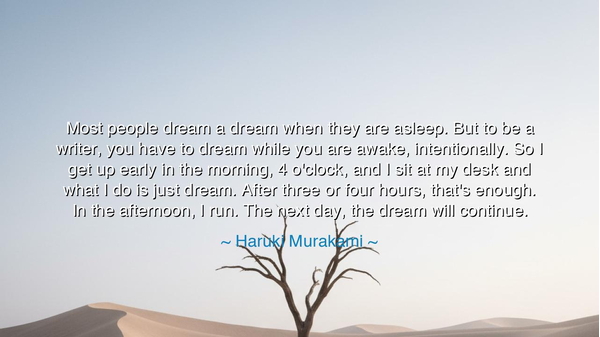
Most people dream a dream when they are asleep. But to be a
Most people dream a dream when they are asleep. But to be a writer, you have to dream while you are awake, intentionally. So I get up early in the morning, 4 o'clock, and I sit at my desk and what I do is just dream. After three or four hours, that's enough. In the afternoon, I run. The next day, the dream will continue.






Hear the words of Haruki Murakami, poet of dreams and chronicler of solitude, who declared: “Most people dream a dream when they are asleep. But to be a writer, you have to dream while you are awake, intentionally. So I get up early in the morning, 4 o’clock, and I sit at my desk and what I do is just dream. After three or four hours, that’s enough. In the afternoon, I run. The next day, the dream will continue.” At first, these words seem but the simple routine of an author. Yet beneath them lies a truth ancient and eternal: that creation is not the fruit of chance, but of discipline, and that the dreams which shape worlds must be cultivated deliberately, not passively awaited in the silence of sleep.
The meaning of this saying is profound. Most people dream without will, their visions fleeting and scattered like smoke at dawn. But the writer—or indeed any creator—must dream intentionally, calling forth visions in the light of day, weaving worlds from the threads of imagination while fully awake. Murakami shows us that art is not born merely of inspiration, but of ritual, of rising in the still hours before the world stirs, and daring to dream with eyes open. In this way, he transforms dreaming into labor, imagination into practice, and vision into craft.
The origin of this wisdom lies in the ways of the ancients. The seers and prophets of old were said to walk between waking and dreaming, bringing back visions to guide their people. The Greeks spoke of the Muses who visited poets in the early hours, whispering words to those disciplined enough to listen. The mystics of India rose before dawn for meditation, knowing that in the silence of the morning the spirit is most clear. Murakami stands in this lineage, shaping not prophecy but literature, yet drawing from the same ancient rhythm: awaken early, enter the stillness, and let the visions flow.
Consider the story of Marcus Aurelius, the Roman emperor who bore the weight of empire, yet each dawn turned to his desk to write his Meditations. There, in the quiet before the burdens of command, he dreamed intentionally—of virtue, of mortality, of the order of the universe. These writings were not casual thoughts but disciplined awakenings, the fruit of a man who learned to dream with purpose. Like Murakami, Marcus knew that creation and reflection must be carved into the day with ritual, else they vanish beneath the noise of life.
The lesson is clear: to build anything lasting—whether books, art, wisdom, or character—you must train yourself to dream awake. Do not wait for inspiration to arrive as a gift in sleep, but summon it with discipline, rising early, creating space for it, giving it form through daily practice. The dream that continues, as Murakami says, is not the one that drifts aimlessly, but the one renewed each day through labor, ritual, and persistence.
Practical actions must follow. Rise earlier than comfort would have you rise. Dedicate the first hours of your day to your highest work, whether it is writing, creating, or reflecting. Guard this time fiercely, for it is in the morning that the mind is most pure and uncorrupted by distraction. Then, as Murakami runs in the afternoon, find balance: give the body its discipline as you have given the mind. Let each day become a cycle of dreaming, working, moving, and restoring—so that tomorrow the dream may continue.
And so, child of tomorrow, heed the wisdom of Murakami. To dream while asleep is common, but to dream awake is rare. The dreamer who disciplines himself, who rises with the dawn and gives form to vision, becomes a maker of worlds, a shaper of futures. Do not let your dreams remain smoke in the night; anchor them in the light of day, return to them with ritual, and carry them forward step by step. For those who learn to dream awake will find that their creations outlive them, echoing in the hearts of generations yet to come.






AAdministratorAdministrator
Welcome, honored guests. Please leave a comment, we will respond soon